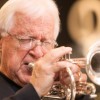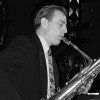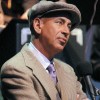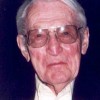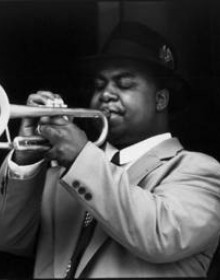
When asked about his goals, Nicholas Payton responded,
"At this point in my career I'm trying to develop a foundation by playing with as many masters as I can. I'm basically trying to develop so that my performance can be representative of the jazz tradition. I am striving to mature to the point at which I can express my emotions through my horn so that when people hear me they will understand exactly what I'm trying to say. By doing this I hope that I can add a positive experience to peoples' lives and to the music . I also hope to become a leader so that I may influence others as others have influenced me."
Nicholas' extraordinary talent undoubtedly has something to do with the many people who have influenced the 21-year-old New Orleans-born trumpeter. The list begins with his parents Walter (an acoustic bassist) and Maria (a former operatic singer and pianist) Payton, who initially exposed Nicholas to music and encouraged his studies. At the age of four, Nicholas' father brought him a trumpet and began teaching him the basics. He taught him how to hold and get a sound out of the instrument, fingerings for different notes, and how to read music. Nicholas' mother is responsible for his appreciation of classical music and inspired him to become an accomplished classical pianist.
There were several teachers who provided information and guidance that contributed to the musical and intellectual foundation upon which Nicholas is still building. E. Diane Lyle provided Nicholas' first formal trumpet lessons, Connie Breaux taught him music theory and prepared him to participate in music festivals as a classical pianist, in which he consistently earned superior rankings. Also instrumental in his classical training was Dr. Bert Braud. Clyde Kerr and Ronald Benko, his instructors at NOCCA were admired by Nicholas because of their genuine interest in helping students learn to play music. Ellis Marsalis provided Nicholas with alternative ways of looking at music and taught him how to intellectualize it.
Wynton Marsalis has been and continues to be a very significant figure in Nicholas' development as a jazz musician. Nicholas was only thirteen when he first met Wynton via an unsolicited phone audition. Actually Wynton had called to talk to Nicholas' father, and when Nicholas learned who was on the phone he pulled out his horn and began to play. Wynton was so impressed, he asked Nicholas to come to his house so that he could hear more. It was Wynton who first taught Nicholas the art of improvisation. Nicholas has performed with Wynton's band on several occasions and Wynton has recommended Nicholas to several band leaders, all of whom have been extremely impressed with his musical ability.
One of those recommendations went to Elvin Jones, with whom Nicholas worked and served as musical director. About Mr. Jones Nicholas says: "the opportunity to play with someone at that level of mastery taught me several things, especially the level of manhood and seriousness that you must address in order to play jazz."
Marcus Roberts has also worked with Nicholas at Wynton's suggestion. Nicholas played in Marcus' band during the summer of 1990 and was impressed by the information that Marcus provided about the interrelation between music and his personal life.
Clark Terry once told Nicholas a story about his younger days when he asked an older musician for advice and was intentionally misinformed. It was then that Mr. Terry vowed to always help younger musicians. Nicholas was one of the fortunate beneficiaries of Mr. Terry's decision. During the summer of 1990, Nicholas performed with Mr. Terry on the S.S. Norway Jazz Cruise and on several other engagements. While working with him Nicholas says that "I learned a lot about the joy and happiness in the music."
Nicholas' experience with his peers has also contributed to his growth. From May through July 1992 Nicholas toured with Jazz Futures,a group that was composed of some of today's most talented young jazz musicians. This environment allowed Nicholas greater decision-making latitude, with him frequently serving as the group's leader.
Nicholas' first album as a leader was released in 1995, From This Moment on Verve Records. Nicholas has been fortunate to have had the advice and direction of so many caring and skillful people. However, he can take some of the credit for the bright future that lies ahead. Nicholas deserves credit because he demonstrated all the necessary qualities of intelligence, discipline, willingness to work hard, and the patience to resist the temptation of immediate gratification that enables one to take advantage of the wisdom of others.


